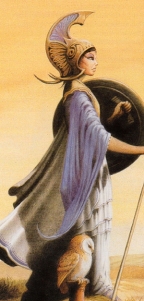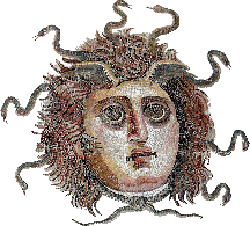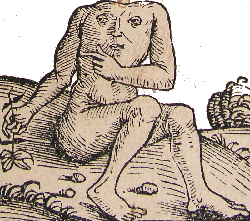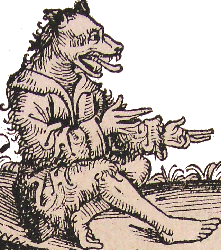ATLANTEANS IN AFRICA: HERODOTUS AND DIONYSIUS SKYTOBRACHION
Whilst Herodotus is quite prosaic in his description of two similarly-named groups in the region of "Mount Atlas," Dionysius' account, as it appears in the work of Diodorus Siculus, concerns a mythical groups of Libyan Amazons, female warriors who subjected and allied with the Atlanteans of Cernê (a Phoenician colony along the African coast) and fought on their behalf against a euhemerised tribe of Gorgons!
HERODOTUS
Atlantis was, according to Herodotus, the name of an ocean [1.202.4].
However, the historian also knows of a people named Atlantes [4.184.3-4]: -
Once more at the distance of ten days' there is a salt-hill, a spring, and an inhabited tract. Near the salt is a mountain called Atlas, very taper and round; so lofty, moreover, that the top (it is said) cannot be seen, the clouds never quitting it either summer or winter. The natives call this mountain "the Pillar of Heaven"; and they themselves take their name from it, being called Atlantes. They are reported not to eat any living thing, and never to have any dreams.
Herodotus describes the "wandering" inhabitants of Libya living around salt hills with springs of water emerging, in a line upon a sandy ridge at ten days' distance from one another running from Thebes in Egypt as far as the Pillars of Hercules and beyond. The weary, querulous Atarantians live around the fourth, with the Atlantes, hard by their mountain, at the fifth.
The similarity of the names of these last two people led Pliny the Elder (who also states that Atlantia was a former name of Ethiopia [6.35]) to confuse the two similarly-named groups [5.8]: -
The Atlantes, if we believe what is said, have lost all characteristics of humanity; for there is no mode of distinguishing each other among them by names, and as they look upon the rising and the setting sun, they give utterance to direful imprecations against it, as being deadly to themselves and their lands; nor are they visited with dreams, like the rest of mortals.
Herodotus notes that the Atarantes have no names. The notion that they "have lost all characteristics of humanity" is an interesting one, and echoes a possible fate of the Atlanteans from Plato.
It is also worth noting Herodotus' choice of phrase: the Atlantes live around the "Pillar of Heaven," which certainly matches Atlas' traditional role in Greek thought and accords particularly well with Homer's description from the Odyssey [1.54], where Atlas "supports the great columns that separate earth and sky."
The name of a unique sanctuary dedicated to this figure in Boeotia also corroborates this: according to Pausanias, it commemorates Atlas' having "sat and meditated deeply upon hell and heaven" at this location [9.20.3], whose name - Πόλος ("Polus") - signifies the "axis of the celestial sphere."
Other interesting inhabitants of this area, according to Herodotus, are the dog-headed Cynocephali - more commonly associated with India and later identified as baboons - and the Blemmyae, headless men whose faces are on their chests [4.191].
Pliny adds more details [5.1]: -
It is from the midst of the sands [...] that [Mount Atlas] raises its head to the heavens; rugged and craggy on the side which looks toward the shores of the ocean to which it has given its name, while on that which faces the interior of Africa it is shaded by dense groves of trees, and refreshed by flowing streams; fruits of all kinds springing up there spontaneously to such an extent, as to more than satiate every possible desire. Throughout the daytime, no inhabitant is to be seen; all is silent, like that dreadful stillness which reigns in the desert. A religious horror steals imperceptibly over the feelings of those who approach, and they feel themselves smitten with awe at the stupendous aspect of its summit, which reaches beyond the clouds, and well nigh approaches the very orb of the moon. At night, they say, it gleams with fires innumerable lighted up; it is then the scene of the gambols of the Ægipans and the Satyr crew, while it re-echoes with the notes of the flute and the pipe, and the clash of drums and cymbals. [...] The space which intervenes before you arrive at this mountain is immense, and the country quite unknown.

Additionally, Herodotus explains that, whilst the nomads (whether or not this includes the Atalantes) worship only the sun and moon, the sedentary people who live around Lake Tritonis worship Athena, Triton and Poseidon [4.188-189].
Athena's aegis is said to have its origins in this part of Libya, and "Athena" here would most likely represent the Egyptian goddess Neith or her Libyan counterpart.
The mention of the aegis is interesting in that it connects through Greek mythology with Diodorus' mention of the Gorgons as a people of this region and enemies of the Atlantians.
DIONYSIUS SKYTOBRACHION
Diodorus Siculus, writing later than Herodotus and Plato, also placed a people termed Atlantians in "the westernmost part of Libya next to the Oceanus at the πέρατα."
His description, based on a lost work - most likely fiction - by Dionysius Skytobrachion, begins with a noteworthy tribe of female warriors, the Lybian Amazons, who had their original dwelling was also on an island [3.53.4]: -
As mythology relates, their home was on an island which, because it was in the west, was called Hespera, and it lay in the marsh Tritonis. This marsh was near the ocean which surrounds the earth and received its name from a certain river Triton which emptied into it; and this marsh was also near Ethiopia and that mountain by the shore of the ocean which is the highest of those in the vicinity and impinges upon the ocean and is called by the Greeks Atlas.
This is a rather strange description geographically, given that Tritonis is generally placed close to Carthage much further east than Mount Atlas, but we'll run with it.
Importantly, Diodorus records a disaster in the region which led to the disappearance of this western Tritonis [3.55.3]: -
The story is also told that the marsh disappeared from sight in the course of an earthquake, when those parts of it which lay towards the ocean were torn asunder.
The Amazons found a city in their home patch, Cherronesus, and expand outwards, conquering their more civilised neighbours, beginning with the Atlantians [3.54.1]: -
The first people against whom they advanced, according to the tale, was the Atlantians, the most civilized men among the inhabitants of those regions, who dwelt in a prosperous country and possessed great cities; it was among them, we are told, that mythology places the birth of the gods, in the regions which lie along the shore of the ocean.
Despite their advancements, the Atlantians were reduced to subjection [3.54.4-6]: -
Upon entering the land of the Atlantians they defeated in a pitched battle the inhabitants of the city of Cernê, as it is called, and making their way inside the walls along with the fleeing enemy, they got the city into their hands; and desiring to strike terror into the neighbouring peoples they treated the captives savagely, put to the sword the men from the youth upward, led into slavery the children and women, and razed the city. But when the terrible fate of the inhabitants of Cernê became known among their fellow tribesmen, it is related that the Atlantians, struck with terror, surrendered their cities on terms of capitulation and announced that they would do whatever should be commanded them, and that the queen Myrina, bearing herself honourably towards the Atlantians, both established friendship with them and founded a city to bear her name in place of the city which had been razed; and in it she settled both the captives and any native who so desired. Whereupon the Atlantians presented her with magnificent presents and by public decree voted to her notable honours, and she in return accepted their courtesy and in addition promised that she would show kindness to their nation.
The name Cernê applied to the Atlantians' capital is interesting: it is first attested in Hanno's Periplus as a Carthaginian trading centre, and gained some note as the proverbial furthest known part of this region.
After the Amazons' conquest of the Atlantians, the vanquished solicit the aid of their new mistresses to deal with another matriarchy: the Gorgons [3.54.7-55.1]: -
And since the natives were often being warred upon by the Gorgons, as they were named, a folk which resided upon their borders, and in general had that people lying in wait to injure them, Myrina, they say, was asked by the Atlantians to invade the land of the afore-mentioned Gorgons. [...] But when the Gorgons drew up their forces to resist them a mighty battle took place in which the Amazons, gaining the upper hand, slew great numbers of their opponents and took no fewer than three thousand prisoners; and since the rest had fled for refuge into a certain wooded region, Myrina undertook to set fire to the timber, being eager to destroy the race utterly, but when she found that she was unable to succeed in her attempt she retired to the borders of her country. [...] Now as the Amazons, they go on to say, relaxed their watch during the night because of their success, the captive women, falling upon them and drawing the swords of those who thought they were conquerors, slew many of them; in the end, however, the multitude poured in about them from every side and the prisoners fighting bravely were butchered one and all.

Thus, another group associated with the west, even before the time of Plato, are brought into the narrative by Dionysius to fight the equally-matriarchal Amazons to an effective standstill, whereupon the latter turn their ambitions eastwards, eventually raiding as far as the Anatolian coast.
The Gorgons also appear as a Libyan tribe in euhemerising tellings of Greek myth, with Medusa being the beautiful queen of this people of the Tritonis region who is slain in combat by Perseus. Meanwhile, Dionysius - or at least Diodorus - provides us with an Atlantean cosmogony, the details of which do not immediately concern us.






